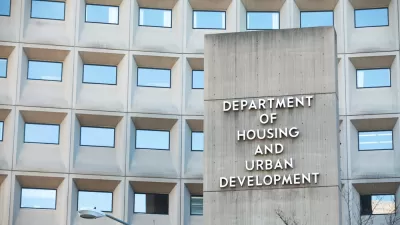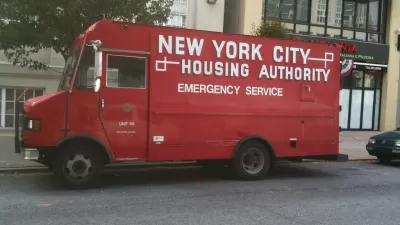Work requirement programs achieve very little in helping housing assistance recipients find work, according to a recent study.

Patrick Sisson shares news of a new study by Diane K. Levy, a principal research associate for the Urban Institute, about the benefits of working requirements for housing aid.
The research used a Chicago Housing Authority (CHA) program as its case study, as explained by Sisson:
The CHA implemented a work requirement policy as part of the Moving to Work demonstration project in 2009, a HUD initiative that allowed some local housing authorities to test out new policies. These types of requirements have already been included in Temporary Assistance for Needy Families, or TANF (federal cash assistance), and the Supplemental Nutrition Assistance Program (SNAP, formerly known as food stamps).
Sisson also summarizes the findings, "Levy's research […] found that in 2017 roughly 1 in 6 of the CHA’s 30,000 residents were subject to the work requirement policy. And of those 5,232 subject to the mandate, 54 percent met the requirement; 23 percent were in what’s called 'safe harbor' status, meaning they were within a 90-day probationary period to find work; 17 percent qualified for an exemption; and 6 percent didn’t meet the requirement."
Levy's interpretation of these findings is that the impact of the program has been far less successful than hoped among the housing officials who promote a self-sufficiency approach to housing aid. At the current moment, the most famous proponent of the "by-your-own-bootstraps" philosophy about government support programs is U.S. Department of Housing and Urban Development Secretary Ben Carson. In the past, Secretary Carson has used this logic even to justify proposed rent increases for people receiving assistance for housing.
FULL STORY: Work requirements for housing aid aren’t very effective, finds study

Planetizen Federal Action Tracker
A weekly monitor of how Trump’s orders and actions are impacting planners and planning in America.

Maui's Vacation Rental Debate Turns Ugly
Verbal attacks, misinformation campaigns and fistfights plague a high-stakes debate to convert thousands of vacation rentals into long-term housing.

Restaurant Patios Were a Pandemic Win — Why Were They so Hard to Keep?
Social distancing requirements and changes in travel patterns prompted cities to pilot new uses for street and sidewalk space. Then it got complicated.

In California Battle of Housing vs. Environment, Housing Just Won
A new state law significantly limits the power of CEQA, an environmental review law that served as a powerful tool for blocking new development.

Boulder Eliminates Parking Minimums Citywide
Officials estimate the cost of building a single underground parking space at up to $100,000.

Orange County, Florida Adopts Largest US “Sprawl Repair” Code
The ‘Orange Code’ seeks to rectify decades of sprawl-inducing, car-oriented development.
Urban Design for Planners 1: Software Tools
This six-course series explores essential urban design concepts using open source software and equips planners with the tools they need to participate fully in the urban design process.
Planning for Universal Design
Learn the tools for implementing Universal Design in planning regulations.
Heyer Gruel & Associates PA
JM Goldson LLC
Custer County Colorado
City of Camden Redevelopment Agency
City of Astoria
Transportation Research & Education Center (TREC) at Portland State University
Jefferson Parish Government
Camden Redevelopment Agency
City of Claremont





























